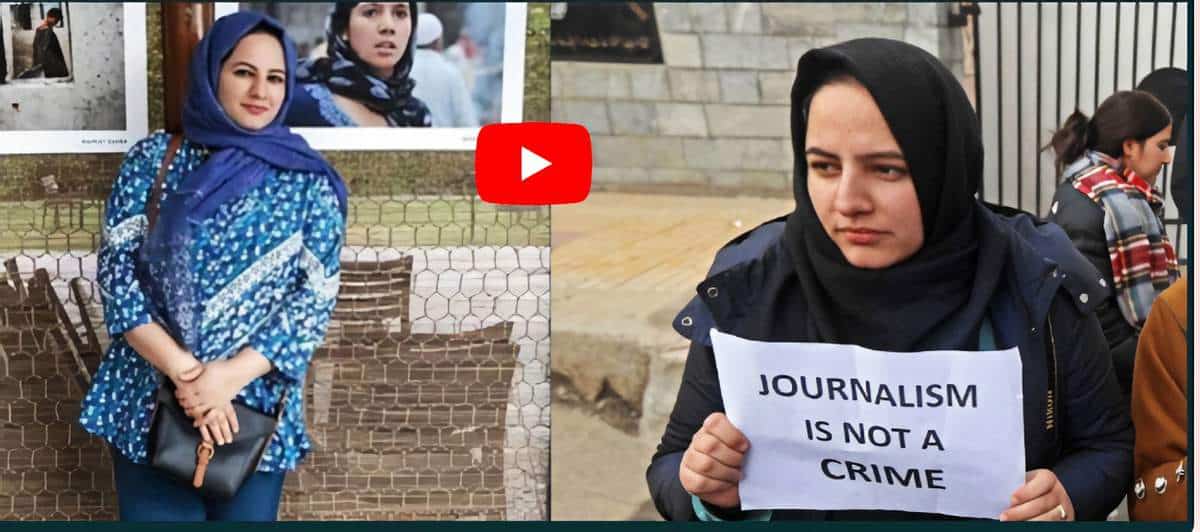Srinagar: Journalist Masrat Zahra, who was booked for uploading anti-national posts, was questioned by police on Tuesday in connection with the case filed against her under Unlawful Activities Prevention Act, officials said.
Zahra was questioned for more than an hour at the Kashmir’s Cyber Police Station in Shergarhi area of the city, they said. After the questioning, the freelance journalist said she has answered the investigators’ questions.
“I met the concerned police officials of the case and answered their questions regarding the investigation, I have not been arrested and the investigation is going. Thanks all for the support,” she tweeted.
Ahead of her appearing before the police, Zahra said she was going to defend her rights as a journalist. “So wish me good luck because it’s time to defend my rights as a journalist, Going inside cyber police station,” she tweeted.
Zahra is one of the two journalists in Kashmir who were booked on Monday for reportedly posting anti-national content on social media and publishing a “fake” news story, police said.
While she was booked for a Facebook post about slain Hizbul Mujahideen commander Burhan Wani, Srinagar correspondent of The Hindu Peerzada Ashiq was booked for a story about recent Shopian encounter in which two militants were killed.
“A case has been registered against Zahra for uploading anti-national posts with a criminal intention to induce the youth and promote offences against tranquillity,” a police official had said. PTI MIJ
The FIR was registered on April 18 under Section 505 of the Indian Penal Code (Statements conducing to public mischief) and relevant sections of the Unlawful Activities (Prevention) Act.
“The user is believed to be uploading photographs that can provoke the public to disturb law and order and is also uploading posts that tantamounts to glorify the anti-national activities and dent the image of law enforcement agencies besides causing disaffection against the country,” it added.
Editors Guild of India demand withdrawal of charges
Meanwhile, the Editors Guild of India on Tuesday expressed concern over the “high-handed manner” in which the law enforcement agencies in Jammu and Kashmir used prevailing laws to deal with two Srinagar-based journalists and demanded that the charges against them be withdrawn.
In a statement, the Guild also said it believes that this is an indirect way of intimidating journalists in the rest of the country as well.
It noted that while only an FIR has been filed in connection with a report filed by Peerzada Ashiq, a reporter working for The Hindu, the authorities in the Union Territory have used the Unlawful Activities Prevention Act against Masrat Zahra, a young freelance photographer.
“Any recourse to such laws for merely publishing something in the mainstream or social media is a gross misuse of power. Its only purpose can be to strike terror into journalists,” the Guild said.
The editors’ body said it has noted with shock and concern, the “high-handed manner” in which the law enforcement agencies in Jammu and Kashmir have used the prevailing laws to deal with the two Srinagar-based journalists.
“The journalists should be put to no harm or further harassment. If the government has any grievance against their reporting, there are other ways of dealing with such issues in the normal course,” the Guild said.
Mere social media posts of factual pictures can’t attract the toughest anti-terror laws passed for hardened terrorists, it said.
In the case of The Hindu reporter, the correct course was to escalate the complaint to the newspaper’s editor, the Guild said.
It demanded that the Union Territory administration of Jammu and Kashmir withdraw the charges forthwith.
Twitterati lodge protest
The press bodies and journalists, however, took to social media to lodge their protest against the action.
“Masarat Zehra, a professional photojournalist has honestly told stories of Kashmir in 4-year career. Invoking UAPA (unlawful activities prevention act) is outrageous. In solidarity with our colleague, we demand FIR (be) withdrawn. Journalism is not crime. Intimidation/censorship won’t silence Kashmir’s journalists,” Moazum Mohammad, vice president of Kashmir Press Club, said in a tweet.
The press club, in a statement, also asked Union Home Minister Amit Shah and Jammu and Kashmir Lt Governor G C Murmu to issue directions for putting an end to harassment of journalists in the Union Territory.
It said there have been instances wherein scribes were harassed for travelling to report stories.
“The Jammu and Kashmir government, especially the police, needs to understand that there is a vast difference between journalism and cyber crime,” the press club said in reference to the Cyber police station summoning both the journalists.
While Ashiq was summoned on Sunday before being directed to appear before police in Anantnag district in late evening hours, Zahra was summoned to the Cyber police station on Saturday.
Meanwhile, the Twitterati and journalists in Kashmir started the hashtag #IStandWithMasratZahra in support of the woman journalist.
Iltija Mufti comes out in support
PDP president Mehbooba Mufti’a daughter Iltija Mufti said intimidating and harassing journalists in Jammu and Kashmir to stifle reportage has become the norm.
“Masarat Zahra, a photojournalist was booked under draconian UAPA for allegedly ‘uploading anti national posts’. In J&K using VPNs or social media is now seen as a threat to public order,” Iltija tweeted from her mother’s handle.
In another tweet, she said, “Predominantly media in the country is largely pliable. The ones that have any credibility left are hounded & punished. It’s worse for journalists from J&K who report at the cost of their lives. TOI reporter Samiya Latief was bullied & trolled on twitter.”
The action against the two journalists comes amidst a crackdown by police, including its cyber wing, on internet users peddling fake news or uploading anti-national content on the virtual platform.
According to police sources, at least five persons, including a policeman, have been arrested over the past one month for posting anti-national or inflammatory content on social media and circulating fake news.

